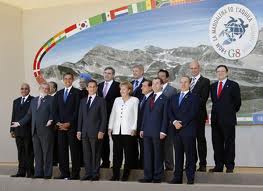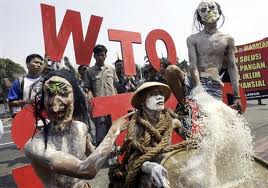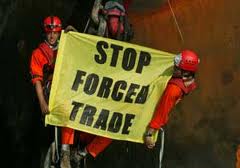The Transatlantic Business Dialogue (TABD) gives the US-EU block strategic direction in the WTO negotiations and this provides a formidable power block to bully and marginalize smaller countries. This was evident at the WTO Ministerial Meeting in Doha in 2001. An African delegate claimed: ‘we made so many suggestions before Doha but they were ignored… We gave texts. We didn’t know where they went, but they didn’t find their way to the draft declaration’. Similarly a South Asian delegate pointed out: ‘We would object to a text, but it would still appear. We would state we wanted a text added in, and still it would not appear.’ A mbassador Chidyausiku of Zimbabwe noted:
mbassador Chidyausiku of Zimbabwe noted:
In Doha, the spin-doctors had realised that in Seattle, Ministers felt ignored, and developing countries were prepared to bite the bullet. In Doha, they created a process, where Ministers could go to the Committee of the Whole (COW) and discuss and raise issues, but nobody was taking into account what they said. They were just venting their frustration. That feeling of being part of the process dented their anger of being uninvolved. But in fact, there was a smaller group taking the decisions of the whole.
Developing nations were denied access to ‘green room’ discussions. This is a system of private informal negotiations between self-selected nations, typically the US, EU, Canada, Japan, Australia, NZ, Switzerland, Norway, and a few others including a few trusted developing countries. Excluded nations have to ‘hang around in the corridor’ waiting to find out what has been decided. Negotiations continued day and night and small delegations from poorer nations were worn out from lack of sleep. In addition, the US and the EU put pressure on the Presidents and Prime Ministers of various African and Asian countries to reign in their delegates at Doha.
 US Trade Representative Robert Zoellick, WTO Director-General Mike Moore and EU Trade Commissioner Pascal Lamy were all promoting the message that free trade, and in particular the proposed new trade round, was part of the war against terrorism. ‘Launching the new trade talks and security issues, before only remotely connected, became one and the same cause…. The US and EU WTO trade agendas, though starkly self-interested, became a small concession in return for continued good political relations and being part of the new coalition against terrorism.’ In particular, Pakistan and Malaysia, both of which had initially been very opposed to the new round, became less strident after Sept 11. Both also received some sort of US aid package at this time.
US Trade Representative Robert Zoellick, WTO Director-General Mike Moore and EU Trade Commissioner Pascal Lamy were all promoting the message that free trade, and in particular the proposed new trade round, was part of the war against terrorism. ‘Launching the new trade talks and security issues, before only remotely connected, became one and the same cause…. The US and EU WTO trade agendas, though starkly self-interested, became a small concession in return for continued good political relations and being part of the new coalition against terrorism.’ In particular, Pakistan and Malaysia, both of which had initially been very opposed to the new round, became less strident after Sept 11. Both also received some sort of US aid package at this time.
A supposed link between terrorists and those who were opposed to free trade was also made by various business lobby groups. The ICC stated on its website that if the Doha talks failed it would ‘be acclaimed by all enemies of freer world trade and investment, including those behind the attacks at the World Trade Center and the Pentagon.’ O’Hare, chair of USCIB, also lumped ‘the forces of terror and anti-globalization’ into the same anti-trade category.
It was a theme taken up by US negotiators. Mokhiber and Weissman noted in Alternet: ‘No one has been more shameless in linking their agenda to the terror attack than U.S. Trade Representative Robert Zoellick.’
On the last day the assembly was presented with a document that was even worse, from the perspective of developing nations, than the previous versions that they had been negotiating. At this late stage the only choice that countries had was to acquiesce or object to the text and be blamed for the failure of the talks. In the post-Sept 11 atmosphere, where the US was on the lookout for enemies to blame, no country was willing to do this. Thus, the new round was launched.
 Following Doha, a coalition of developing nations presented the WTO with a set of reform measures to ensure that future negotiations would be more fair, open and democratic. However the powerful players continued to meet in secret to set the agenda of the forthcoming Ministerial meeting at Cancún, Mexico in 2003 and the ‘arm-twisting and blackmailing practices’, to use EU Trade Commissioner Lamy’s words, also continued.
Following Doha, a coalition of developing nations presented the WTO with a set of reform measures to ensure that future negotiations would be more fair, open and democratic. However the powerful players continued to meet in secret to set the agenda of the forthcoming Ministerial meeting at Cancún, Mexico in 2003 and the ‘arm-twisting and blackmailing practices’, to use EU Trade Commissioner Lamy’s words, also continued.
The draft text presented to the Cancún meeting was put together by the WTO without consultation with the full WTO membership and reflected the position of the US and the EU rather than the developing nations. After days of ‘negotiations’ a revised draft was presented to the meeting, a day before it was due to end, that still ignored the views of the developing countries, still contained the issues that they had rejected including investment and government procurement, and failed to make any progress on the issue of free trade in agriculture.
For this round developing countries had formed coalitions and negotiating blocks to counter the power of the developed nation coalitions and US and EU attempts to break down these developing nation coalitions were unsuccessful. Although George Bush personally telephoned the heads of state of individual countries, and other countries were offered expanded export quotas and bilateral free trade agreements with the US, most nations stuck to their groupings.
The betrayal felt by the developing nations at seeing the revised draft, the obstinacy of the EU and the US in refusing to give any ground, and the ability of developing countries to maintain a united front and not give in this time, led to the failure of the negotiations. The brinkmanship of the powerful countries, which had worked so well in the past, in insisting on agreement to a total package that would include investment and government procurement, backfired this time.
Efforts to break down developing nation unity continued after the meeting. The ActionAid report on the negotiations notes:
The central strand to this strategy is to turn developing countries against each other, breaking off individual countries from broader coalitions and offering preferential treatment to favoured groupings if they distance themselves from more critical voices at the WTO. This divide and rule strategy is particularly dangerous at a time when WTO negotiations have again become increasingly secretive.
Chakravarthi Raghavan, editor of the South-North Development Monitor (SUNS), says that in talks during 2004, the chair of the WTO’s Non-Agricultural Market Access (NAMA) negotiating group met with individual and small groups of countries during which he showed them proposals to get their comments but would not give them the documents so they were unable to take them back to their governments to discuss them.
Further negotiations in 2004 resulted in the dropping of investment, government procurement and competition policy from the agenda of the current round of negotiations but in return ‘developing nations will have to open up their economies to imports of manufactured goods and to large service companies in return for vague promises on agricultural reform.’ According to Peter Hardstaff from the World Development Movement (WDM), speaking in August 2004 after a framework agreement had been reached for ensuing WTO negotiations: ‘the negotiating process has once again been characterised by secrecy, power politics, and the exclusion of the poorest countries. The past week of talks has seen Africa sidelined, while the group of ‘five interested parties’ – USA, EU, Brazil, Australia and India – has negotiated on the rest of the world’s behalf’.